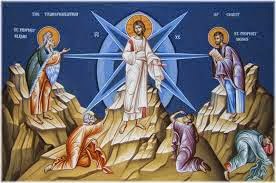O You who did not desire that the body of the Virgin,
the Mother of
Salvation, who became a holy ark in whom You dwelt in flesh,
remain on
earth but You raised it up to heaven after her death,
upon the hands of
the holy angels and archangels.
Fraction Prayer of St. Mary's Feast:
O God, who dwells in the highest and looks upon the hearts of His humble servants, who willed to visit us with mercy and come to us incarnate of the Holy Spirit and of the holy Virgin Mary.
O You who promised our father Adam with salvation and confirmed His holy promise to all the fathers by His virginal Birth in the fullness of time from a pure and chaste, first-born Virgin.
He sanctified her, purified her, filled her with grace, and preferred her above all women of the world. She is the ever-virgin, Mary, the new Eve, the pride of our race and the second bodily heaven.
O You who loved us, and out of the fullness of His love and mercy, out of signs to His righteousness and justice, and out of His wisdom and fairness, He desired to save us from the death of the original sin and rescue us from its eternal punishment, by dying on our behalf in a human flesh which He took from the Virgin Mary, the Mother of Salvation.
While the first Eve was the source of destruction, the new Eve became the gate of heaven.
O You who was incarnate of the first-born Virgin, You honored her everlasting virginity and perfect chastity through Your Birth from her, for she is an image of the original glory, on which God created our forefathers Adam and Eve when they were together in the Paradise of joy.
O You who honored the second Eve by dwelling in her womb for nine full months and was formed of her by the Holy Spirit, who dwelt upon her.
He took flesh, having a human soul, uniting with it in one hypostasis and one nature and the Logos was born of her, who was and is, the blessed God forever.
O You who came out of the womb of the Virgin, while her virginity is sealed.
You who was nursed by the milk of the Virgin, while His is the Fountain of grace to all the creation. He was nurtured in her bosom, He slept in her arms, and sat in her lap while also sitting on a cherubimic chariot and is worshiped by the holy angels and archangels.
O You who honored Egypt by Your coming to it, riding on a swift and light cloud. The idols of Egypt were shaken in Your presence and the heart of Egypt melted. Oh, what was this swift and light cloud except the Virgin Mary, in her purity, kindness and everlasting chastity?
O You who desired to honor motherhood in Mary the Virgin by always obeying her, answering her calling, accepting her intercessions and responding to her prayers.
O You who entrusted Your Mother the Virgin with Your disciple, John the Beloved, and made John her son. And through John, You granted us Your Mother as our own, and through the faith we became her children.
O You who did not desire that the body of the Virgin, the Mother of Salvation, who became a holy ark in whom You dwelt in flesh, remain on earth but You raised it up to heaven after her death, upon the hands of the holy angels and archangels.
O You who honored us and our race, as You took flesh from Mary the Virgin, and ascended with it into the heaven, performing an eternal redemption, He sat on the throne, and thus in You we are able to sit on the right hand of the Father.
O God of mercy, have mercy upon us and forgive our sins. Accept the intercession of Your Mother, the Virgin, on our behalf. Make us worthy to touch Your holy Body and precious Blood, so that, with a pure heart, an enlightened soul, an unashamed face, a faith unfeigned, a perfect love, and a firm hope, we may cry to Your holy Father who art in heaven, and pray thankfully:
Our Father Who art in heaven;
hallowed be Thy name.
Thy kingdom come.
Thy will be done on earth as it is in heaven.
Give us this day our daily bread.
And forgive us our trespasses,
as we forgive those who trespass against us.
And lead us not into temptation,
but deliver us from evil,
in Christ Jesus our Lord.
For Thine is the kingdom,
the power and the glory,
forever.
Amen.











